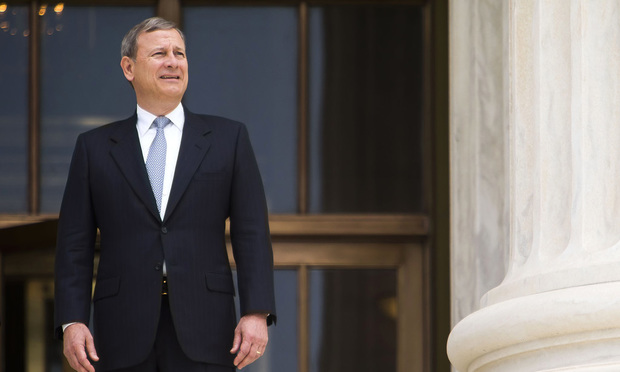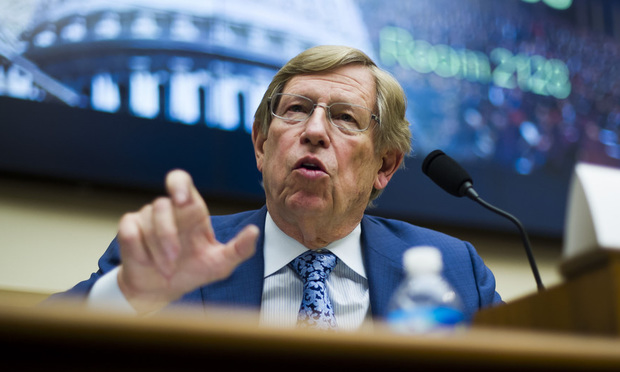Roberts, Urged to Overrule Race-Based 'Insular Cases,' Questioned Relevance
Chief Justice John Roberts Jr. twice said he did not see the relevance of the Insular Cases because the other parties in the case were not relying on them in the high court. The Insular Cases are a series of decisions from the early 1900s that created a distinction between incorporated and unincorporated territories.
October 15, 2019 at 03:49 PM
5 minute read
 Chief Justice John Roberts Jr. Credit: Diego M. Radzinschi / ALM
Chief Justice John Roberts Jr. Credit: Diego M. Radzinschi / ALM
A first-time advocate had one message for the U.S. Supreme Court in Tuesday's arguments involving Puerto Rico's fiscal crisis: Take this "perfect opportunity" to overrule the high court's discredited, race-based "Insular Cases." But Chief Justice John Roberts Jr., responding to the lawyer, said he didn't see the "pertinence."
The Insular Cases, a series of decisions from the early 1900s, created a distinction between incorporated and unincorporated territories, with U.S. citizens of the former enjoying full constitutional rights and an ultimate guarantee of statehood, and citizens of the latter having limited constitutional protections and no guarantee of statehood. Decided by the same court that ruled in Plessy v. Ferguson, they are now regarded as being infused with racial bias.
"The court-made doctrine of territorial incorporation means that when my client, and even myself, return to Puerto Rico, we will have a lesser set of constitutional rights than what we have standing here today," said Jessica Mendez-Colberg, counsel to a labor union that participated in Tuesday's arguments.
In Financial Oversight and Management Board for Puerto Rico v. Aurelius Investment, Mendez-Colberg, partner in Bufete Emmanuelli in Ponce, Puerto Rico, shared time with Theodore Olson, partner in Gibson, Dunn & Crutcher. They argued that the board created by Congress to deal with the island's multibillion-dollar debt load violated the Constitution's appointments clause because its members were "officers of the United States" who had not been nominated by the president and confirmed by the U.S. Senate. Olson represented Aurelius Investment, a creditor.
 Ted Olson, of Gibson, Dunn & Crutcher. Credit: Diego M. Radzinschi / ALM
Ted Olson, of Gibson, Dunn & Crutcher. Credit: Diego M. Radzinschi / ALMThe U.S. Court of Appeals for the First Circuit agreed with their argument and noted that the Insular Cases hovered "like a dark cloud" over the appointments clause challenge. But the appellate court declined to overrule them because, it said, it could reach a decision on alternative grounds.
In the high court, Donald Verrilli Jr., partner at Munger, Tolles & Olson, and Deputy Solicitor General Jeffrey Wall countered that the appointments clause did not apply to the board members because they were territorial officers acting on behalf of Puerto Rico.
Mendez-Colberg told the justices that her opponents had been relying on the Insular Cases since the beginning of the litigation to establish that even the structural provisions of the Constitution—such as the appointments clause—do not apply to Puerto Rico.
Roberts twice said he did not see the relevance of the Insular Cases because the other parties in the case were not relying on them in the high court.
"I thought the argument was that the appointments clause does apply to Puerto Rico and the question is simply whether it's implicated on these particular facts with respect to this particular agency?" Roberts asked Mendez-Colberg. When she answered yes, Roberts added, "I guess again, I just don't see the pertinence of the Insular Cases."
Mendez-Colberg said it was "very convenient" for her opponents to rely extensively on the Insular Cases in the district court, which had no authority to overrule them, but to declare them irrelevant when the case was before the Supreme Court.
Mendez-Colberg reminded the justices that the court, in the travel-ban ruling Trump v. Hawaii from last year, disavowed Korematsu v. United States.
The Supreme Court had long been pressed to overturn Korematsu, a World War II decision approving the internment of Japanese Americans. In the travel ban decision, Roberts did reject the ruling even though, he said, the Korematsu opinion "has nothing to do with this case."
"But still it was a morally repugnant doctrine that was purely on the basis of race," she said, referring to Korematsu. "The same here with the Insular Cases. And I cannot stress enough that the parties have relied on the Insular Cases in this case. That is why it's the perfect opportunity to address them."
Five amicus briefs were filed in support of overruling the Insular Cases. The briefs were on behalf of the American Civil Liberties Union and the ACLU of Puerto Rico, scholars of constitutional law and legal history, former federal and local judges from the territories of Guam, Puerto Rico and the U.S. Virgin Islands, Equally American Legal Defense and Education Fund, and the U.S. Virgin Islands Bar Association.
Read more:
What New Supreme Court Cases Reveal About Big Law Billing Rates
Puerto Rico Cases Pit Don Verrilli Against Ted Olson at Supreme Court
Supreme Court's Repudiation of 'Korematsu' Is Bittersweet for Rights Advocates
This content has been archived. It is available through our partners, LexisNexis® and Bloomberg Law.
To view this content, please continue to their sites.
Not a Lexis Subscriber?
Subscribe Now
Not a Bloomberg Law Subscriber?
Subscribe Now
NOT FOR REPRINT
© 2025 ALM Global, LLC, All Rights Reserved. Request academic re-use from www.copyright.com. All other uses, submit a request to [email protected]. For more information visit Asset & Logo Licensing.
You Might Like
View All
US Judge Cannon Blocks DOJ From Releasing Final Report in Trump Documents Probe
3 minute read
Private Equity Giant KKR Refiles SDNY Countersuit in DOJ Premerger Filing Row
3 minute read
Several Big Law Firms Saw Year-Over-Year Lobbying Revenue Growth in 2024
4 minute readTrending Stories
- 1The Intersection of Labor Law and Politics Following the Presidential Election
- 2Critical Mass With Law.com’s Amanda Bronstad: LA Judge Orders Edison to Preserve Wildfire Evidence, Is Kline & Specter Fight With Thomas Bosworth Finally Over?
- 3What Businesses Need to Know About Anticipated FTC Leadership Changes
- 4Federal Court Considers Blurry Lines Between Artist's Consultant and Business Manager
- 5US Judge Cannon Blocks DOJ From Releasing Final Report in Trump Documents Probe
Who Got The Work
J. Brugh Lower of Gibbons has entered an appearance for industrial equipment supplier Devco Corporation in a pending trademark infringement lawsuit. The suit, accusing the defendant of selling knock-off Graco products, was filed Dec. 18 in New Jersey District Court by Rivkin Radler on behalf of Graco Inc. and Graco Minnesota. The case, assigned to U.S. District Judge Zahid N. Quraishi, is 3:24-cv-11294, Graco Inc. et al v. Devco Corporation.
Who Got The Work
Rebecca Maller-Stein and Kent A. Yalowitz of Arnold & Porter Kaye Scholer have entered their appearances for Hanaco Venture Capital and its executives, Lior Prosor and David Frankel, in a pending securities lawsuit. The action, filed on Dec. 24 in New York Southern District Court by Zell, Aron & Co. on behalf of Goldeneye Advisors, accuses the defendants of negligently and fraudulently managing the plaintiff's $1 million investment. The case, assigned to U.S. District Judge Vernon S. Broderick, is 1:24-cv-09918, Goldeneye Advisors, LLC v. Hanaco Venture Capital, Ltd. et al.
Who Got The Work
Attorneys from A&O Shearman has stepped in as defense counsel for Toronto-Dominion Bank and other defendants in a pending securities class action. The suit, filed Dec. 11 in New York Southern District Court by Bleichmar Fonti & Auld, accuses the defendants of concealing the bank's 'pervasive' deficiencies in regards to its compliance with the Bank Secrecy Act and the quality of its anti-money laundering controls. The case, assigned to U.S. District Judge Arun Subramanian, is 1:24-cv-09445, Gonzalez v. The Toronto-Dominion Bank et al.
Who Got The Work
Crown Castle International, a Pennsylvania company providing shared communications infrastructure, has turned to Luke D. Wolf of Gordon Rees Scully Mansukhani to fend off a pending breach-of-contract lawsuit. The court action, filed Nov. 25 in Michigan Eastern District Court by Hooper Hathaway PC on behalf of The Town Residences LLC, accuses Crown Castle of failing to transfer approximately $30,000 in utility payments from T-Mobile in breach of a roof-top lease and assignment agreement. The case, assigned to U.S. District Judge Susan K. Declercq, is 2:24-cv-13131, The Town Residences LLC v. T-Mobile US, Inc. et al.
Who Got The Work
Wilfred P. Coronato and Daniel M. Schwartz of McCarter & English have stepped in as defense counsel to Electrolux Home Products Inc. in a pending product liability lawsuit. The court action, filed Nov. 26 in New York Eastern District Court by Poulos Lopiccolo PC and Nagel Rice LLP on behalf of David Stern, alleges that the defendant's refrigerators’ drawers and shelving repeatedly break and fall apart within months after purchase. The case, assigned to U.S. District Judge Joan M. Azrack, is 2:24-cv-08204, Stern v. Electrolux Home Products, Inc.











